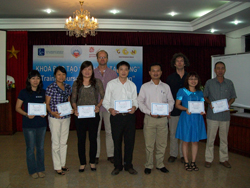Microfinance, it's all in the game
Many people adhere to the slogan ‘Nothing exceeds Groningen.’, yet Prof Dr Robert Lensink, Professor in Finance and Financial Markets isn’t one of them. For many years now he has been conducting research in Africa and Asia. Currently he is doing research into how the Hutu-Tutsi conflict affects the social and financial behaviour of Burundi villagers. In Rwanda he studies the effects of ‘Financial Literacy’ training programmes. In Tanzania he looks into the functioning of trade credit on the rice market and the role of micropensions. And finally, in Dehli (India), Robert studies the effect of cash transfer – constituting a sort of basic income – as opposed to ration cards with which certain products can be bought at a lower price.
Microfinance in Vietnam
Each of these subjects is as fascinating as the other, however for this interview we will focus on North Vietnam. For here, a large experimental research is currently being conducted. In this study the effects of the combination of offering microcredits and training programmes to women and their partners, are being looked into.
Robert’s PhD student Nhung Vu, wanting to do research in her home country of Vietnam, had established contacts with microfinance organization TYM. Not only do they offer women microcredits and courses on accounting and social themes, they also provide assistance to those setting up a business.

Thousands of women apply for a microcredit with TYM. For this study, 5,000 women were selected and randomly divided into three groups. In one group only women take a course, whereas in another group the women follow the course together with their partner. To the participants in the third group no course is offered. Theirs is the control group. The objective of this study is to establish whether the businesswomen are making higher profits after taking the course. But also to look into how the taking of the course affects the decision-making within their family. It is expected that the results will show that the course is more effective when taken by women and their partners together.
The study has been running now for about half a year. Presently, the courses are starting. Prior to the start of the courses the participants were interviewed in order to gain an insight into their economic position within the family as well as into their knowledge of financial matters and of the setting up of a business.
Unique
What is so unique about this particular study, is the fact that it is a randomized experimental study which is being conducted on a large scale. This is thanks to funds put in place for this purpose by the international organization 3IE, allowing for large-scale interviews and more importantly, for additional experiments involving real money. The latter increasing the reliability of the response.Game
One of the special elements of the study is the carrying out of various experiments. One experiment – a game – revolves around the power of decision within the family. After taking part in the course, the women and their partners individually play a game in which they have to decide what they would do if they were given 100 Vietnamese Dong (VND); would they spend the money, would they keep it themselves, or would they give some of it to their partners? Everything is possible. After having individually played this game, the women and their partners play the game a second time. This time however, they have to decide together how the money will be spent. Afterwards the participants get to keep part of the amount with which they played. This makes for a nice extra bit of cash.
Robert and Nhung Vu also benefit from this, as the credibility of the study results is much higher due to the fact that this experimental method allows for better measurement of behaviour.
This way, both the position of the participating women can be strengthened and the possibilities for helping these people in the future can be expanded; a win-win situation all around!
More information
Robert Lensink| Last modified: | 16 March 2020 4.55 p.m. |
More news
-
24 March 2025
UG 28th in World's Most International Universities 2025 rankings
The University of Groningen has been ranked 28th in the World's Most International Universities 2025 by Times Higher Education. With this, the UG leaves behind institutions such as MIT and Harvard. The 28th place marks an increase of five places: in...
-
05 March 2025
Women in Science
The UG celebrates International Women’s Day with a special photo series: Women in Science.
-
16 December 2024
Jouke de Vries: ‘The University will have to be flexible’
2024 was a festive year for the University of Groningen. In this podcast, Jouke de Vries, the chair of the Executive Board, looks back.
